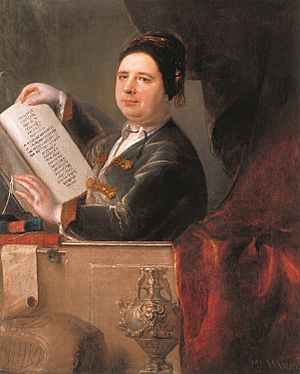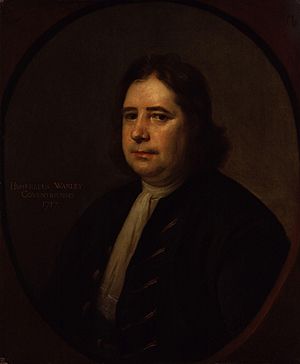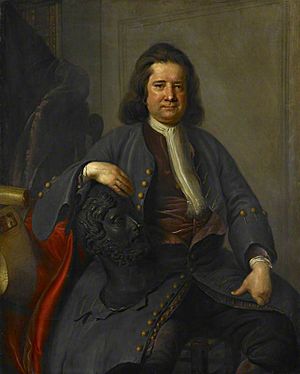Humfrey Wanley facts for kids
Humfrey Wanley (born March 21, 1672 – died July 6, 1726) was an English expert in old handwriting and ancient languages. He was also a librarian and a scholar who studied Old English. Wanley worked for important book collectors like Robert and Edward Harley. He became the very first librarian for their huge collection of books and manuscripts, which is now known as the Harleian Collection.
Contents
Early Life and Learning
Humfrey Wanley was born in Coventry, England, on March 21, 1672. When he was about 15, he started working for a fabric seller, but he spent all his free time studying old books and documents. He loved to copy different styles of ancient writing. It's said that he began by copying an old dictionary of the Anglo-Saxon language.
His amazing skill at understanding old writing became known to William Lloyd, a bishop. The bishop helped Wanley get into St Edmund Hall at Oxford University in 1695. The next year, he moved to University College. Even though he didn't get a degree, he helped a lot with checking the text of the New Testament for a scholar named John Mill.
Working with Old Books
Wanley's talents were first shown to the public when he was just 23. He created lists of old handwritten books (called manuscripts) for schools and churches. These lists were included in a famous book about manuscripts published in 1697.
In 1696, he became an assistant at the Bodleian Library at Oxford, earning £12 a year. He also received extra money for helping with other book projects. Around 1699 and 1700, Wanley traveled across England. He was looking for Anglo-Saxon manuscripts for a scholar named George Hickes. This work led to Wanley creating a detailed list of these manuscripts, which was published in 1705. This book was very important for studying Old English.
Through Hickes, Wanley met Robert Harley, a very powerful collector. Harley was so impressed with Wanley's knowledge of ancient writings that he hired him. In 1708, Wanley began working for Harley, first as a cataloguer and then as the main librarian for his growing collection. He continued to work for Harley and his son, Edward Harley, until his death. His detailed work on their collection is still admired today.
Wanley was known for being very honest and hardworking. He was also good at finding and buying valuable old books and manuscripts for his boss. He kept a daily journal from 1715 to 1726, which has many interesting stories.
Helping the Society of Antiquaries
Wanley was involved in early meetings of a group of scholars interested in old things. These meetings, which started around 1707, eventually led to the creation of the Society of Antiquaries of London. When the society was officially restarted in 1717, Wanley became a Fellow. He also wrote articles for scientific journals about how to figure out the age of old manuscripts.
He had many ideas for new books, including a version of the Bible in Old English and a new edition of the Septuagint (an old Greek translation of the Hebrew Bible). He also started a book about handwriting.
Many letters written by and to Wanley are kept in major libraries today. His collection of Bibles and prayer books was bought by St. Paul's Cathedral shortly before he died.
Later Life and Passing
Humfrey Wanley often had health problems. He passed away from a condition called dropsy on July 6, 1726, in London. He was buried in St Marylebone Parish Church. He was married twice, but sadly, all his children died when they were very young.
Lasting Impact
Wanley made a huge contribution to the study of Old English literature. His 1705 book, which listed and described Anglo-Saxon manuscripts, was incredibly important. Scholars still use it today. Experts say that Wanley was a "great paleographer" (someone who studies old writing) and that his work is still essential for anyone studying Anglo-Saxon manuscripts.
Images for kids
 | John T. Biggers |
 | Thomas Blackshear |
 | Mark Bradford |
 | Beverly Buchanan |







